
Thirty years ago I was a wild and woolly graduate student at the University of British Columbia in Tim Murray's rain-drenched and green home province on Canada's west coast. Among the odds and ends taped to my office door on campus was a cartoonist's sketch. The sketch depicted a doomed mouse defiantly giving the finger to a screaming, demonical hawk in full dive, its deadly, gleaming talons extended and on the verge of both piercing and crushing the life out of the pugnacious rodent.
If not exactly "speaking truth to power," at least this was saying, "I know you're about to destroy me, but screw you anyway."
I was reminded of this cartoon as I read Tim's trenchant and grim post "Is It Game Over for Immigration Reformers in America?" It may well be that those of us toiling fruitlessly for decades to stop what author Lindsey Grant once called "the juggernaut" of U.S. and global population growth - before catastrophe or collapse intercedes - are like that little mouse. I'm inclined to agree, and yet persistent pessimist (realist?) that I am, even I have to admit that perhaps a thin sliver of hope remains; it may even be that this is not forlorn hope or mere grasping at straws.
Tim's analysis is that Barack Obama's win and the Democrats' consolidation of their control of both the House and Senate augur ill for immigration reduction and U.S. population stabilization efforts, and he's absolutely right. The first type of "immigration reform" this emboldened cabal will attempt is a revival of the amnesty proposal - supported by elites almost across the board - that failed in the Senate last year after a popular outcry by rank-and-file Americans across the land. Derided as a "shamnesty" by its opponents, and denied to be an amnesty at all by its proponents, this bill, if passed, would legalize the status of some 12-20 million illegal immigrants now estimated to already be in the USA.

One estimate is that this chain migration would eventually result in 100 million new legal immigrants being added to the U.S. population over the next two decades -
in addition to background or baseline levels of 60-65 million growth.

The framers of the U.S. Constitution envisioned a system of checks and balances that would prevent hasty or ill-considered changes in federal government policy and direction. Usually, passing a law requires getting over more hurdles than a finalist in the 110-meter Olympic event. But many of these hurdles were swept away by November 4's political tidal wave, and the significantly strengthened Democratic control of both the executive (presidency) and the legislative (House and Senate) branches of government.
Tim, joined by many American political analysts, argues that inexorably growing Hispanic and other immigrant populations bolster a multicultural or pseudo-"progressive" consensus that because immigration is good, more (and more and more) immigration must be even better. (Earth First! founder Dave Foreman referred to this as "progressive cornucopianism," part of the left-wing variant of the widely shared delusion that there are no limits to growth. Right-wingers prefer greedy growth while left-wingers prefer feel-good growth. Both worship growth without limit and operate under the reining paradigm that denies the existence of ultimate limits to expanding human appropriation of the earth.)
One Hispanic commenter on CNN, a former high-ranking operative in the Democratic Party, claimed that in the largely conservative Rocky Mountain West, dominated by Republicans for years, big Democratic wins in New Mexico, Colorado, and elsewhere were made possible only by angry Hispanics registering and voting in droves because they were outraged by anti-illegal immigration crusaders Tom Tancredo (retiring Republican congressman from Colorado) and CNN commentator Lou Dobbs.
Reading Tim's post and similar observations also reminded me of what NumbersUSA founder Roy Beck and I wrote in our 2001 monograph Forsaking Fundamentals: The Environmental Establishment Abandons U.S. Population Stabilization. It is worth quoting at some length, because it anticipates the very dilemma we now face:
"Still another reason environmental groups didn't want to tackle immigration numbers to slow U.S. population growth may have been their fear of changing demographics. As the population of foreign-born Americans and their children rose ever higher, they became an increasingly powerful political bloc whom many environmental leaders feared could thwart environmentalist initiatives and legislation if they perceived environmental groups to be hostile to immigration.
"In 1970, immigrants comprised about 5 percent of the American population. By the late 1990s, that figure had risen to almost 10 percent and was still climbing rapidly with no sign of cresting - a predictable consequence of the four-fold increase in immigration levels over the past four decades. In certain key states - particularly California (25 percent), New York (18 percent), and Florida (15 percent) - and a number of influential cities, the percentage of foreign-born in the population was much higher still and was large enough to be the balance of power in some elections.
"The bloc of foreign-born Americans and their children in the late 1990s already was far larger than the bloc of black Americans. The Census Bureau showed that if Congress did not change immigration policy, the bloc of recent immigrants and their descendants would be more than a third of all Americans by the year 2050.
"A number of interests, ranging from private businesses to political parties to environmental groups, assumed that Congress will not change immigration policy and that this revolutionary demographic shift is virtually inevitable, a fait accompli. All positioned themselves to take advantage of the shift as best they could and to keep the shift from hurting them.
"In the case of businesses, this could mean reaching new rapidly growing markets by advertising in a foreign language. In the case of political parties, it meant nurturing immigrants as a source of donations, votes, and political power. And in the case of environmental groups, it could mean trying to avoid any issues that might cause this developing power in American politics to oppose environmentalist political goals.
"Particularly in California where the foreign born and their children already comprised more than a third of the population, Sierra Club leaders worried aloud not only that advocating U.S. population stabilization might lose immigrants, their friends, and family as supporters, but that sensitive political alliances with ethnic politicians could be jeopardized as well.
"Sam Shuchat, the executive director of the California League of Conservation Voters - an organization immersed in state politics - pleaded with the Sierra Club not to '...commit suicide over the immigration issue. This is something the environmental community cannot afford.'
"In this fearful way of thinking, advocacy of immigration reduction to stabilize the population and protect the environment could only be seen by immigrants already here as an attempt to prevent them from becoming a majority of the population in California during the next few years - and of the country later in the next century. Having their future power thus threatened by environmentalists, immigrants would insist that their elected officials vote against environmental protection measures, according to the demographic-fear scenario.
"Former Zero Population Growth president Judy Kunofsky, who also chaired the Sierra Club's Population Committee in the late 1980s...has logged a quarter-century of service and leadership within the environmental and population movements. Kunofsky recalled that some years back, a staffer for a Hispanic member of Congress from Southern California told a Sierra Club representative that the Congressman was outraged that the Club wanted to limit immigration.
"Later, various Latino citizens groups in Los Angeles threatened not to cooperate with the Club on air pollution issues if it were to actively oppose immigration. 'When you have ethnic spokesmen saying to environmentalists that "we won't work with you on clean air if you support immigration restriction," that is an admission that increasing their own numbers takes precedence over all other considerations and that environmental concerns are secondary.'
"Whether the commitment of immigrants toward the environment was that shallow or whether their desire - or ability - to be some sort of monolithic voting bloc was that strong remains undetermined. Public opinion polls would suggest that immigrants were not especially wedded to current immigration numbers and would not react as an angry group if the numbers were reduced back toward a more traditional American level. For years, polls showed immigrants generally agreeing with native-born Americans about reducing future immigration.

For years, polls showed immigrants generally agreeing with native-born Americans about reducing future immigration.

"UCLA astronomy professor and environmental activist Ben Zuckerman was among those in 1998 who dismissed the suggestion that immigrants would retaliate against immigration reduction by insisting that the natural environment of their new country be despoiled. He wrote that if the Sierra Club renewed its proscriptive commitment to U.S. population stabilization, 'political allies will continue to vote for sound environmental legislation when it is in the interests of their constituents - which is what they do now.' Yet even Zuckerman conceded that: "Politically, excessive immigration is very difficult to deal with because, in states with large immigrant populations, politicians are afraid to appear anti-immigrant, and in states with few immigrants, the national level of immigration is not a political issue."
"Whether the fear of immigrant retaliation was justified or not, if believed by environmental leaders, it could have greatly affected their decisions about pursuing U.S. population stabilization. Certainly there were some reasons for the environmental leaders to have adopted such a belief during the Sierra Club's referendum campaign. They heard from some self-appointed immigrant spokespersons who made the threat of retaliation. And Sierra leaders may have drawn similar conclusions from a contingent of California Democratic state-level politicians, many of them Latinos, who directly challenged the Club to defeat the immigration-reduction referendum. 'A position by the club to further limit immigration would be considered immigrant bashing by many elected officials of color with near-perfect environmental records,' Santos Gomez (an appointed member of the Club's National Population Committee) wrote in a newspaper op-ed piece. Pete Carrillo, president of the Mexican Heritage Corp. of Santa Clara County, Calif., told a reporter that if the Sierra Club returned to its policy calling for immigration reductions it would produce 'a gap as wide as the Pacific Ocean between the Sierra Club and the Mexican American Community.'
"Thus, intimidated environmental leaders may have chosen the logic of the executive director of California League of Conservation Voters: If immigrants did retaliate, that would be something 'the environmental community cannot afford.' It would not be a question of whether the environment could afford another doubling of the U.S. population but whether the environmental community could afford immigrant retaliation if environmentalists tried to stop the doubling. Protection of the environmental institutions may have been placed ahead of protection of the environment."
At the end of our 2001 monograph, Roy and I paid homage to the courage and consistency of the late, legendary environmental leaders David Brower and Gaylord Nelson. Brower was former executive director and board member of the Sierra Club, and founder of the League of Conservation Voters, Friends of the Earth, and Earth Island Institute. Among many other achievements, former Democratic Senator Gaylord Nelson and Wisconsin governor founded Earth Day in 1970 and worked as a counselor to the Wilderness Society from 1980 to his death in 2005. To the end of their long lives, both Brower and Nelson remained fiercely outspoken about the need to stop U.S. population growth and rein in immigration. They spoke out even in the face of growing queasiness and paralysis by other environmentalist elites who were understandably fearful of being pummeled and discredited as racist xenophobes by those demagogues ever willing to fling these charges (because they know they work). Nothing will stop a typical high-minded environmentalist in his or her tracks faster than the threat of being accused of "the greening of hate," however baseless the charge.
Roy and I also held out hope in 2001 that, "The growing grassroots concern of numerous rank-and-file environmentalists and ordinary Americans with the multiple problems unavoidably aggravated by overpopulation and overimmigration may yet overturn their leaders' stubborn denial of demographic and ecological realities." I'd be the first to admit that this has not yet happened, and perhaps never will, at least in time to make much of a difference.
Recently, I coauthored a study on immigration and U.S. greenhouse gas emissions with Steve Camarota for the Washington, DC-based thinktank the Center for Immigration Studies. We found that immigrants, on average, increase their per capita emissions of carbon dioxide (CO2) four-fold when they move to the United States from their countries of origin. We also concluded that immigration, because it is expected to account directly and indirectly for about 80% of projected U.S. population growth to 2050, will also account for a comparable percentage of the projected increase in U.S. CO2 emissions under the business-as-usual scenario.
This stunning finding elicited a collective yawn of indifference from the American environmental establishment. To my knowledge, the big guns of this establishment were utterly silent. The Sierra Club, Environmental Defense Fund, Natural Resources Defense Council, Audubon Society, National Wildlife Federation, Greenpeace, and others of their ilk - all of whom purport to want to save both nature and humanity across the country and the planet from the ravages of wanton human/industrial activity - all ignored this study. Instead, the only commentary our research generated was from mass immigration's ever-vigilant defense brigade, some of whom attacked it as "nutty" and another example of "the immigrant blame game," while accusing us of wanting not only to keep people out but keep them poor and pure.
Challenging the many manifestations of the growth paradigm that permeates modern industrial society has always been an uphill, perhaps even futile struggle. In spite of the perennial optimism and hope of people like Donella Meadows (lead author of 1972's The Limits to Growth and subsequent updates) or immigration reformer Roy Beck, in recent years, I sense a growing despondency and resignation that perhaps "overshoot and collapse" really is human civilization's unavoidable destiny. The best-selling 2005 book Collapse by Pulitzer Prize-winning Jared Diamond, Joseph Tainter's The Collapse of Complex Societies, William Catton's pioneering Overshoot: The Ecological Basis of Revolutionary Change, Debora MacKenzie's 2008 article "Why the demise of civilization may be inevitable," in New Scientist, and of course, the www.dieoff.org website founded by Jay Hanson all recount the terrific momentum of irrupting, irrationally exuberant human societies, in which voluntary, collective restraint and the ability to accept "living within limits" are utterly incomprehensible.
Here I can do no better than to quote the late Donella Meadows, in one of the last articles she penned for her syndicated newspaper column The Global Citizen, before her untimely death after a brief but hard-fought struggle with cerebral meningitis in 2001. In a column entitled "Polar Bears and Three-Year-Olds on Thin Ice," she wrote:
Some biologists are saying the polar bear is doomed.
A friend of mine, in response to this news, did the only appropriate thing. She burst out weeping. "What am I going to tell my three-year-old?" she sobbed. Any of us still in contact with our hearts and souls should be sobbing with her, especially when we consider that the same toxins that are in the bears are in the three-year-old. And that the three-year-old over her lifetime may witness collapsing ecosystems, north to south, until all creatures are threatened, especially top predators like polar bears and people.
Is there any way to end this column other than in gloom? Can I give my friend, you, myself any honest hope that our world will not fall apart? Does our only possible future consist of watching the disappearance of the polar bear, the whale, the tiger, the elephant, the redwood tree, the coral reef, while fearing for the three-year-old?

If we believe ... that we are fatally flawed, that the most greedy and short-sighted among us will always be permitted to rule, ... well, then yes, it's over.

Personally I don't believe that stuff at all. I don't see myself or the people around me as fatally flawed. Everyone I know wants polar bears and three-year-olds in our world. We are not helpless and there is nothing wrong with us except the strange belief that we are helpless and there's something wrong with us. All we need to do, for the bear and ourselves, is to stop letting that belief paralyze our minds, hearts, and souls.

Everyone I know wants polar bears and three-year-olds in our world. We are not helpless and there is nothing wrong with us except the strange belief that we are helpless and there's something wrong with us.

In other words, even on the much narrower question of reducing immigration to stop U.S. population growth and avert environmental disaster, although the outlook is grim, it is not hopeless. For one thing, there are cracks in the seeming monolith. Democrats and even ascendant Hispanics and other ethnic groups buoyed by rising immigration are not at all united in favor of open borders. At least before Hispanic politicians, certain Latino chauvinists, and others with a vested interest in an ever-larger Spanish-speaking population in the USA convinced many Hispanics that the pressure to crack down on immigration was little more than anti-Latino bigotry, many Latinos themselves believed that if immigration was a problem, it was because there was too much of it.

Democrats and even ascendant Hispanics and other ethnic groups buoyed by rising immigration are not at all united in favor of open borders.

For example, in a 1996 Roper poll, 52 percent of Hispanics favored reducing immigration to 300,000 or fewer annually (from more than a million). The 1993 Latino National Political Survey, conducted by a research team from the University of Texas, and the largest poll ever conducted of this ethnic group in the United States to that date, found that 7 in 10 respondents thought there were too many immigrants (actually higher than the percentage of non-Hispanic whites or "Anglos" who did). A 1993 Hispanic USA Research Group poll found that three-quarters of Hispanics believed fewer immigrants should be admitted.

... I talked incessantly
en español about the perils of overpopulation, and often found a less skeptical audience on the part of Latin Americans than North Americans.


Latinos have also shown that concern about illegal or excessive immigration is not strictly an Anglo or North American phenomenon: Mexicans upset about Salvadorans and other Central Americans; Hondurans and Costa Ricans about Nicaraguans; Dominicans upset about Haitians; ...

Out-of-control immigration actually led to the notorious "soccer [or futbol] war" between Honduras and El Salvador in 1969. For years, hundreds of thousands of unauthorized immigrants had been pouring across the border from heavily overpopulated El Salvador into neighboring Honduras. As one online account puts it:
The Honduran government and some private groups came increasingly to place blame for the nation's economic problems on the approximately 300,000 undocumented Salvadoran immigrants in Honduras.... Attacks were also launched in the media on the impact of Salvadoran immigrant labor on unemployment and wages on the Caribbean coast. By late May, Salvadorans began to stream out of Honduras back to an overpopulated El Salvador.
Tensions continued to mount during June 1969. The soccer teams of the two nations were engaged that month in a three-game elimination match as a preliminary to the World Cup. Disturbances broke out during the first game in Tegucigalpa, but the situation got considerably worse during the second match in San Salvador. Honduran fans were roughed up, the Honduran flag and national anthem were insulted, and the emotions of both nations became considerably agitated. Actions against Salvadoran residents in Honduras, including several vice consuls, became increasingly violent. An unknown number of Salvadorans were killed or brutalized, and tens of thousands began fleeing the country. The press of both nations contributed to a growing climate of near-hysteria, and on June 27, 1969, Honduras broke diplomatic relations with El Salvador.
Early on the morning of July 14, 1969, concerted military action began in what came to be known as the Soccer War.
- OnWar.com, Armed Conflict Events Data, at:
www.onwar.com/aced/data/sierra/soccer1969.htm
My point is just that even on the narrow question of immigration reform alone, although the immediate future is daunting, it's impossible to say how both the political climate and demographic trends may change in just a few years time. While I myself think long-term demographic projections are crucial to understanding the consequences of current and future assumed demographic parameters (birth rates, death rates, immigration and emigration rates), I recognize all too well the shortcomings of these same projections, because the underlying demographic variables are inherently unpredictable. Too many times projections from even the most reputable sources have proved utterly, laughably, wrong, because no demographer has a crystal ball; unfortunately, over the last decade or two, these projections have proved to be too conservative - that is, they have underestimated actual growth.
People like Roy Beck who know far more than I do about America's immigration politics are indeed concerned about what an Obama presidency and a stronger Democratic congress portend for immigration reform. But they are not ready to throw in the towel just yet, and some actually argue that Obama will be better, or at least not as bad, as McCain would have been.
The larger issue Tim raises, that of the struggle against the pervasive ethos of perpetual growth in population and consumption that surely doom the ecosphere and our prospects for environmental sustainability, remains as challenging as ever. Just ask the mouse in the cartoon.
By Leon Kolankiewicz, 14 Nov 08
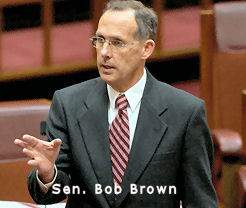





 who represents Tasmania in the Senate. (She is informed on peak oil and other energy issues and has some good discussions on her site.)
who represents Tasmania in the Senate. (She is informed on peak oil and other energy issues and has some good discussions on her site.)
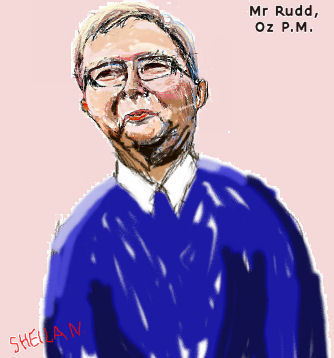




 (Photo of Mary Drost) The Brumby Government tried to undermine this crucial Melbourne Rally and to avoid criticism by announcing they were modifying their offensive Bill, so the mainstream journalists stayed away. But the alternative press is growing and we will not fall for such simple ploys. PEOPLE POWER AT WORK See
(Photo of Mary Drost) The Brumby Government tried to undermine this crucial Melbourne Rally and to avoid criticism by announcing they were modifying their offensive Bill, so the mainstream journalists stayed away. But the alternative press is growing and we will not fall for such simple ploys. PEOPLE POWER AT WORK See  Today Victorian activist groups working together stopped legislation which could have defined any local councillor who may have previously actively opposed a particular development proposal as an 'interested party' and hence ineligible to vote. Demonstrators wore tape over their mouths on the steps of Victoria's Parliament.
Today Victorian activist groups working together stopped legislation which could have defined any local councillor who may have previously actively opposed a particular development proposal as an 'interested party' and hence ineligible to vote. Demonstrators wore tape over their mouths on the steps of Victoria's Parliament.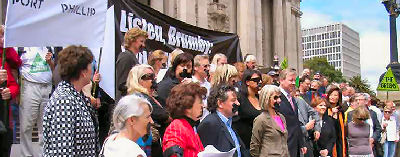
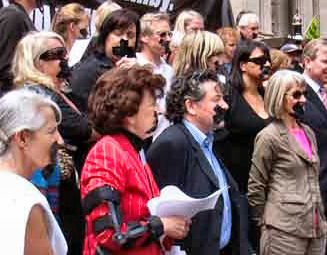
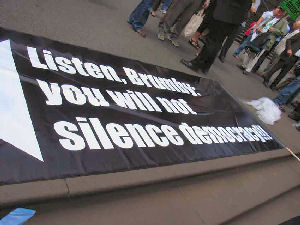


 As an apolitical organisation, Fair Water Use has been a more than occasional critic of Senator Wong, but it can scarcely be a surprise that the Minister appeared phased during her interview when you consider the pressure that these individuals, groups and governments are applying - attempting to derail the initial efforts of the Federal Government to counter the endemic abuse of the resources of the Murray-Darling.
As an apolitical organisation, Fair Water Use has been a more than occasional critic of Senator Wong, but it can scarcely be a surprise that the Minister appeared phased during her interview when you consider the pressure that these individuals, groups and governments are applying - attempting to derail the initial efforts of the Federal Government to counter the endemic abuse of the resources of the Murray-Darling.
 "VCAT unelected, unaccountable and system has lost all respect from community." VCAT is Victoria's Civil and Administrative Tribunal. (Australia)
"VCAT unelected, unaccountable and system has lost all respect from community." VCAT is Victoria's Civil and Administrative Tribunal. (Australia)
 Victorian Planning dictators aim at iconic Macedon Ranges (Hanging Rock region). Where will it end? Call to Victorians and the world ....
Victorian Planning dictators aim at iconic Macedon Ranges (Hanging Rock region). Where will it end? Call to Victorians and the world ....
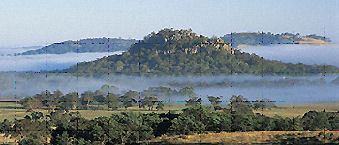
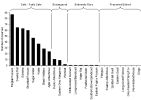 In 1845 the Mornington Peninsula was thick with wildlife: herds of kangaroos, wombats, wallabies, many echidnas and koalas and glorious birds, all unused to man and quite tame and inquisitive. ...wonderful trees, abundance of silver wattles, when in blossom, gilded the country and filled the air deliciously with their sweetness. Now population growth is turning the Peninsula into a desert. Research and graphs by Malcolm Legg and Hans Brunner.
In 1845 the Mornington Peninsula was thick with wildlife: herds of kangaroos, wombats, wallabies, many echidnas and koalas and glorious birds, all unused to man and quite tame and inquisitive. ...wonderful trees, abundance of silver wattles, when in blossom, gilded the country and filled the air deliciously with their sweetness. Now population growth is turning the Peninsula into a desert. Research and graphs by Malcolm Legg and Hans Brunner. 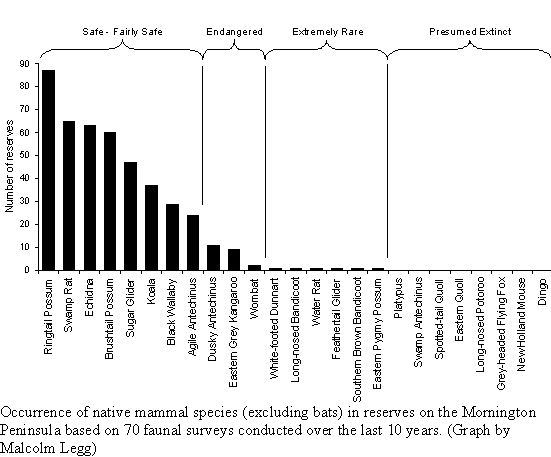
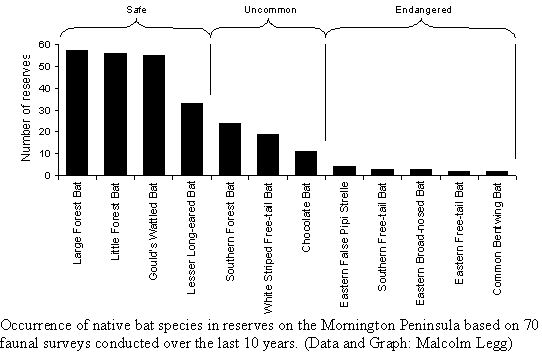
 We sometimes complain about politicians who don't do what they promise to do after they get elected. Ironically, it is sometimes much better for the country when some of these promises are broken.
We sometimes complain about politicians who don't do what they promise to do after they get elected. Ironically, it is sometimes much better for the country when some of these promises are broken.
Recent comments